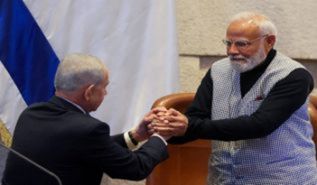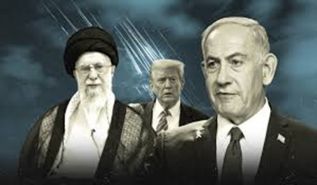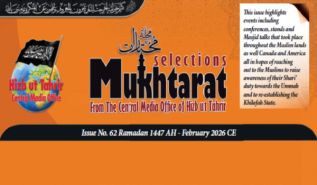بسم الله الرحمن الرحيم
Abu Bakr as-Siddiq (ra)
(Translated)
https://www.al-waie.org/archives/article/19987
Al Waie Magazine Issue No. 470
Thirty-Ninth Year, Rabi’ al-Awwal 1447 AH corresponding to September 2025 CE
Baha al-Husseini
When you contemplate the biography of Abu Bakr (may Allah be pleased with him), you will find that leadership based on Iman is not just a slogan, but rather an approach implemented by the first of the Khulafaa’ Rashideen (Rightly-Guided Caliphs) after the passing of the Prophet (saw) to the Most High, Allah (swt). Abu Bakr (ra) was a true statesman, establishing his state on the basis of the Shariah Law of Allah (swt), not the balance of power. He established the concept of obedience to Allah (swt) Alone. He was the guardian of Iman and the unity of the state. After the death of the Prophet (saw), the Ummah faced its most serious political and ideological crisis, represented by the apostasy of some tribes, the refusal of others to pay zakat, and the emergence of false prophets.
Here, Abu Bakr (ra) took a decisive legal stance, uttering his famous words,
«والله لو منعوني عقالًا كانوا يؤدونه إلى رسول الله صلى الله عليه وسلم لقاتلتهم عليه» “By Allah, if they withheld from me even a rope they used to give to the Messenger of Allah ﷺ I would fight them over it.” His understanding of Islamic Shariah Law was not limited to the establishment of Salah (Shariah prayer) and Sawm (Shariah fasting), but instead encompassed the protection of the pillars of the Islamic state from disintegration, and the preservation of the Islamic system within the Ummah’s political, financial, and military reality.
Follow their guidance.
The saying of Allah (swt) that, [فَبِهُدَاهُمُ اقْتَدِه] “So follow their guidance” [TMQ Surah Al-Anaam: 90] is a clear Dawah to follow the guidance of the righteous, not for intellectual luxury or financial gain. Among the most prominent of these Companions (ra) is the noble Abu Bakr al-Siddiq (ra), whom the Prophet (ra) chose to lead the Muslims in Salah during his final illness. Abu Bakr (ra) embodied the highest levels of commitment to Islam and adherence to the Sunnah of the Prophet (saw). He skillfully and devoutly determined the affairs of the Islamic state after the Prophet's death, preserving the principles of unity of Iman and establishing the rule of the Shariah Law of Allah (swt) in its comprehensiveness.
When Abu Bakr al-Siddiq (ra) assumed the Khilafah (Caliphate) after the death of the Messenger of Allah (saw), eyes gathered upon Saqifah Bani Sa'idah, where he was contracted bay’ah upon the Khilafah (Caliphate) with a general bay’ah of obedience was made to him. He emphasized that he had not come out of ambition for power as much as he was keen to protect the Ummah and establish the Shariah Law of Allah (swt) among its people. In his opening khutba (sermon) to the Muslims, he (ra) said,
«يا أيها الناس، قد وُليت عليكم ولست بخيركم، فإن أحسنتم فأعينوني، وإن أسأتم فقوموني... أطيعوني ما أطعتُ الله ورسولَه، فإذا عصيتُه فلا طاعة لي عليكم»
“O people, I have been appointed over you, and I am not the best among you. If you do well, then support me, and if you do wrong, then correct me... Obey me as long as I obey Allah and His Messenger. If I disobey Him, then you owe me no obedience,” thus reinforcing the concept of obedience conditional upon the Shariah Law of Allah (swt) alone.
Abu Bakr (ra) continued following the Prophet’s (saw) approach of consolidating the Islamic state despite the turmoil that beset it. He confronted what became known as the Wars of Apostasy when some Arabs abandoned the obligatory zakat (Shariah charity) and their faith was exposed. When Umar (ra) objected, saying,
«كيف تقاتل هؤلاء وقد قال الرسول صلى الله عليه وسلم: «أُمِرت أن أقاتل الناس حتى يقولوا لا إله إلا الله»»
“How can you fight these people when the Prophet ﷺ said, ‘I have been commanded to fight the people until they say, ‘There is no god but Allah,’” Abu Bakr (ra) asserted that he would never hesitate to address the injustices faced by Muslims and secure their rights, saying,
«وَاللَّهِ لَأُقَاتِلَنَّ مَنْ فَرَّقَ بَيْنَ الصَّلَاةِ وَالزَّكَاةِ... وَلَقَاتَلْتُهُمْ عَلَى مَنْعِهَا»
“By Allah, I will fight whoever differentiates between Salah and zakat... and I will fight them for withholding it.”
This serious stance reflects his firm belief that consolidating the rule of Islam and unifying the Ummah is more important than anything else, and that the ruler must not hesitate to implement the Shariah rulings in order to protect the Islamic Ummah from collapse.
For this reason, the Khaleefah (Caliph) Abu Bakr (ra) remained completely subject to the Shariah rulings, without addition or subtraction. Hizb ut Tahrir states in its book, “The System of Ruling Governance in Islam” that “Obedience to the Muslim ruler who rules according to Islam is obligatory... and there is no obedience in disobedience”.
What Al-Mawardi says in Al-Ahkam Al-Sultaniyyah (Shariah Rulings of Authority) confirms this,
«فَفَرَضَ عَلَيْنَا طَاعَةَ أُولِي الْأَمْرِ فِينَا» “He imposed upon us obedience to those in Shariah authority over us,” meaning that Muslims were obligated to obey whoever was in charge of their affairs, the Khaleefah, in implementing the Shariah Law of Allah (swt) without dispute. Consequently, Abu Bakr (ra) was the Ummah’s representative in implementing the Shariah rulings of Allah (swt), not a king who enacted laws based on his own whims, nor was he a ruler who deferred to the people's opinions based on his whims.
Together, these Shariah legal and political concepts affirm that the Shariah solution to the crises facing our Ummah and the world is to rebuild a comprehensive Islamic entity that fully implements Islamic Shariah Law as revealed by Allah (swt) by establishing the Khilafah Rashidah (Rightly-Guided Caliphate) on the Method of Prophethood. Only through this system will the Ummah regain its dignity and unity and return to leadership of the world.
Allah (swt) said,
[هَٰذَا بَلَٰغٞ لِّلنَّاسِ وَلِيُنذَرُواْ بِهِۦ وَلِيَعۡلَمُوٓاْ أَنَّمَا هُوَ إِلَٰهٞ وَٰحِدٞ وَلِيَذَّكَّرَ أُوْلُواْ ٱلۡأَلۡبَٰبِ]
“This Quran is a sufficient message for humanity so that they may take it as a warning and know that there is only One God, and so that people of reason may be mindful.” [TMQ Surah Ibrahim: 52].




